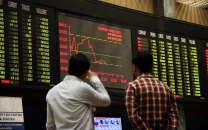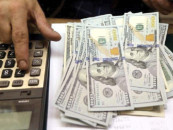After Tajir Dost flop, 1% levy proposed
Tola Associates suggests tighter cash limits, discouraging rupee devaluation

After the spectacular failure of the Tajir Dost scheme, which fetched a meagre Rs3 million against Rs437 billion paid by the salaried class so far, a tax advisory firm has recommended imposing a 1% income tax on all traders to ensure decent revenue collection.
Tola Associates has also proposed limiting cash transactions to only Rs10,000 to discourage the informal economy, which has enabled traders to remain largely outside the tax net.
These proposals were submitted this week to Deputy Prime Minister Ishaq Dar and Finance Minister Muhammad Aurangzeb. The firm also recommended that the government avoid further currency devaluation in the next fiscal year, challenging official projections that estimate the rupee falling to Rs290 to a dollar by June next year.
The advisory firm has proposed that the government abolish the Tajir Dost scheme. Launched in June last year with the aim of collecting at least Rs50 billion, the International Monetary Fund (IMF)'s staff-level report disclosed this month that the scheme generated only Rs4 million. In contrast, the salaried class paid Rs437 billion in taxes during the first 10 months of this fiscal year, Rs150 billion higher than the same period last year.
The firm recommended a 1% minimum income tax on all retailers, in addition to taxes already collected from wholesalers and retailers. It proposed that the tax be collected based on revenues generated under withholding tax clauses 236G and 236H. However, it is unlikely that the government will accept this recommendation.
To enhance transparency and curb tax evasion, Tola Associates urged the government to ban cash transactions beyond Rs5,000 to Rs10,000 at retail and food outlets, mandating electronic payments. However, the Federal Board of Revenue (FBR) lacks the enforcement capacity to ensure compliance or to prevent businesses from discouraging digital payments.
In a key recommendation, the firm stated that the upcoming budget should discourage currency devaluation by reducing non-essential imports, boosting local manufacturing and energy independence, promoting domestic value addition, and generating employment. It noted that economic stability requires a stable currency, targeted inflation, and no further devaluation.
"Based on our estimates for FY26, if the current account deficit stands at 0.5% of GDP, the exchange rate should ideally stabilise around Rs276," said the report presented to the finance minister.
However, the report noted that with the average exchange rate hovering around Rs280 this year, a potential depreciation of Rs10 to Rs15 could occur in FY26, bringing the rate to Rs290295 per dollar. Such devaluation could push inflation up by an estimated 3%, it warned.
The government has already finalised the next budget based on an exchange rate of Rs290 per dollar.
The firm also advocated export-led growth by implementing policies such as rationalising interest rates for industries, maintaining a balanced tariff policy on raw materials, and developing export-oriented industrial clusters.
It added that promoting import substitution and offering result-based subsidies in key sectors like textiles, pharmaceuticals, and engineering goods is crucial for long-term sustainability.
According to the firm, the 2025-2026 budget presents a critical opportunity for course correction and to reset the direction of the economy. It pointed out that the current policy rate of 11% remains a major barrier to industrial borrowing and investment. It urged the government to further reduce the real interest rate to the lower single digits to stimulate industrial expansion, particularly for capital-intensive manufacturing.
To revive idle capacity and encourage new investment, the government should introduce a zero-markup loan scheme for priority manufacturing sectors. These concessional loans would reduce financial barriers and support import substitution, job creation, and export competitiveness.
Tola Associates also expressed doubt over the FBR's ability to meet the next fiscal year's tax collection target of Rs14.1 trillion. The firm estimated that tax collection might reach Rs13.5 trillionfalling short of the IMF's target.
It added that based on current trends, the FBR is likely to collect Rs11.9 trillion this fiscal yearRs1 trillion short of its original target. However, if the outcome of the super tax cases is in the government's favour, the FBR could potentially achieve Rs12.1 trillion.
The firm reiterated its recommendation to impose an advance tax on undistributed reserves of companies that have not issued dividends for the past three years. It proposed a tax rate of 7.5% for unlisted and 5% for listed companies. This tax could be adjusted against future dividend taxes.
It has also proposed changing the definition of resident Pakistani for the taxation purposes. "Pakistan is recommended to modernize its residency criteria to reflect actual economic presence and intent".
Under its suggested framework, an individual would be considered a resident if they spend 182 days or more in Pakistan in a financial year. Those staying between 120 and 181 days would be assessed based on citizenship and income.
For instance, a Pakistani citizen under the Pakistan Citizenship Act, 1951, or someone holding a Pakistan Origin Card (POC) with income above a certain threshold and no tax liability elsewhere, should be treated as a Resident but Not Ordinarily Resident (RNOR).
Individuals not meeting these conditions and spending less than 120 days in Pakistan should be classified as Non-Residents, regardless of income or nationality, the firm added.




















COMMENTS (2)
Comments are moderated and generally will be posted if they are on-topic and not abusive.
For more information, please see our Comments FAQ